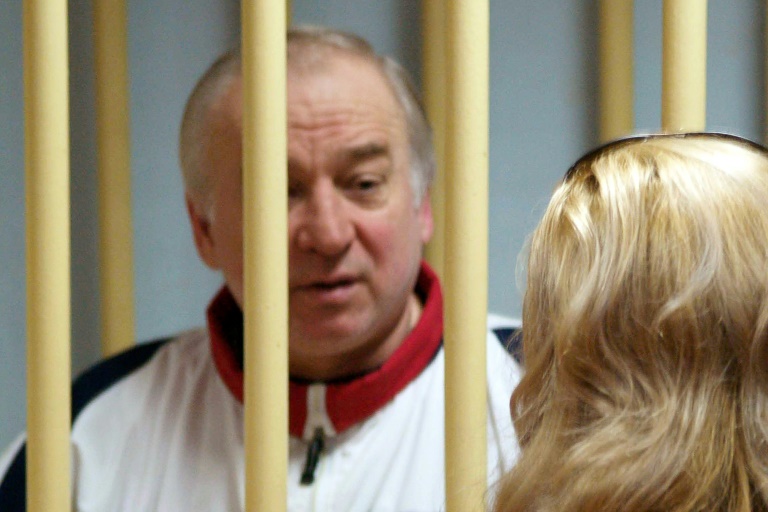
In 2010, he benefited from a spy swap between Moscow on the one side and London and Washington on the other © Kommersant Photo/AFP/File / Yuri SENATOROV
London, United Kingdom, Mar 12 – A retired Russian double agent was leading a seemingly peaceful life in rural Britain when he and his visiting daughter were targeted in a nerve agent attack.
Here is what we know about the Sergei Skripal affair.
Who is Sergei Skripal?

Skripal settled in the small city of Salisbury, best known for its medieval cathedral © AFP/File / Chris J Ratcliffe
A former colonel in the Russian military intelligence service, Sergei Skripal was accused of “high treason” in 2006 for selling information to Britain and sentenced to 13 years in prison.
In 2010, he benefited from a spy swap between Moscow on the one side and London and Washington on the other.
In a highly unusual move, Russia agreed to release a double agent arrested in its territory, but received 10 Russian spies released by Washington in exchange.
His new life

This undated image is taken from the Facebook page of Yulia Skripal and allegedly shows the daughter of the former Russian spy © FACEBOOK PAGE OF YULIA SKRIPAL/AFP/File
The former agent settled in the small city of Salisbury, southwest of London, best known for its medieval cathedral.
Here he lived an apparently unremarkable existence, setting up home in a modest red-brick suburban housing estate.
But another Russian exile, Valery Morozov, told British media that he had not stopped his espionage activities and was working in cyber-security.
What happened on March 4?
Skripal and his daughter Yulia, who arrived on a visit from Russia the day before, drove into Salisbury and parked in the car park of The Maltings shopping centre.
They had a drink at The Bishop’s Mill pub and then ate lunch at Italian restaurant Zizzi, leaving around 3:35 pm.
Emergency services were called to a bench near the shopping centre at about 4:15 pm, finding them in what police said was an “extremely serious condition”.

Skripal and his daughter were found in critical condition at The Maltings shopping centre © AFP/File / Ben STANSALL
One of them had vomited, while Sergei Skripal had glazed eyes and was shaking his hands towards the sky, witnesses said.
They were immediately taken to hospital, where police said Tuesday they remain in a critical condition.
One of the first officers at the scene, Nick Bailey, was also hospitalised. He remains in a serious condition, but police said he was “making good progress”.
Another 35 people were assessed for possible exposure, all but one of them swiftly discharged. One person is being monitored as an outpatient, but has shown no signs of illness.
What substance was used?

Britain’s Home Secretary Amber Rudd said the toxin was ‘very rare’ © PRU/AFP/File / PRU
Experts at Porton Down laboratories have identified the substance used as a military-grade nerve agent “of a type developed by Russia”, and part of a group of such agents known as Novichok.
Prime Minister Theresa May on Monday gave Moscow until the end of Tuesday to “provide full and complete disclosure of the Novichok programme” to the Organisation for the Prohibition of Chemical Weapons.
The OPCW is the implementing body of the Chemical Weapons Convention, which entered into force in 1997 and has 192 member states.
May said police were still investigating how the dose of the nerve agent was administered.
Who is responsible?

The case revived memories of the death of Alexander Litvinenko, an ex-Russian spy and Kremlin critic was who poisoned in 2006 with radioactive polonium in London on orders from Moscow © AFP/File / Martin HAYHOW
“The government has concluded that it is highly likely that Russia was responsible for the act against Sergei and Yulia Skripal,” May said.
She added that Britain had reached the verdict based on its knowledge that Russia had previously produced the agent and could still do so, the country’s “record of conducting state-sponsored assassinations” and its analysis that Moscow views some defectors as legitimate targets for killing.
Foreign Secretary Boris Johnson has said the Skripal case has “echoes” of Alexander Litvinenko, a Russian dissident who died of Polonium poisoning in a 2006 attack attributed to Moscow.
Moscow has repeatedly denied involvement in the Salisbury attack and accused Britain of an attempt to “discredit” Russia.
Police said Tuesday that “we are not declaring a person of interest or a suspect at this time”.
About The Author









































